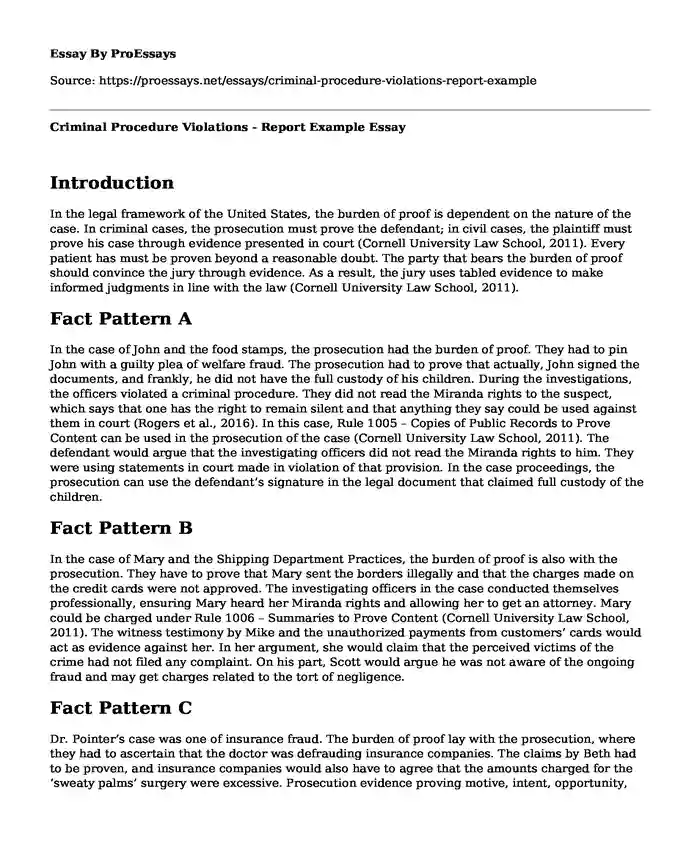Introduction
In the legal framework of the United States, the burden of proof is dependent on the nature of the case. In criminal cases, the prosecution must prove the defendant; in civil cases, the plaintiff must prove his case through evidence presented in court (Cornell University Law School, 2011). Every patient has must be proven beyond a reasonable doubt. The party that bears the burden of proof should convince the jury through evidence. As a result, the jury uses tabled evidence to make informed judgments in line with the law (Cornell University Law School, 2011).
Fact Pattern A
In the case of John and the food stamps, the prosecution had the burden of proof. They had to pin John with a guilty plea of welfare fraud. The prosecution had to prove that actually, John signed the documents, and frankly, he did not have the full custody of his children. During the investigations, the officers violated a criminal procedure. They did not read the Miranda rights to the suspect, which says that one has the right to remain silent and that anything they say could be used against them in court (Rogers et al., 2016). In this case, Rule 1005 – Copies of Public Records to Prove Content can be used in the prosecution of the case (Cornell University Law School, 2011). The defendant would argue that the investigating officers did not read the Miranda rights to him. They were using statements in court made in violation of that provision. In the case proceedings, the prosecution can use the defendant’s signature in the legal document that claimed full custody of the children.
Fact Pattern B
In the case of Mary and the Shipping Department Practices, the burden of proof is also with the prosecution. They have to prove that Mary sent the borders illegally and that the charges made on the credit cards were not approved. The investigating officers in the case conducted themselves professionally, ensuring Mary heard her Miranda rights and allowing her to get an attorney. Mary could be charged under Rule 1006 – Summaries to Prove Content (Cornell University Law School, 2011). The witness testimony by Mike and the unauthorized payments from customers’ cards would act as evidence against her. In her argument, she would claim that the perceived victims of the crime had not filed any complaint. On his part, Scott would argue he was not aware of the ongoing fraud and may get charges related to the tort of negligence.
Fact Pattern C
Dr. Pointer’s case was one of insurance fraud. The burden of proof lay with the prosecution, where they had to ascertain that the doctor was defrauding insurance companies. The claims by Beth had to be proven, and insurance companies would also have to agree that the amounts charged for the ‘sweaty palms’ surgery were excessive. Prosecution evidence proving motive, intent, opportunity, plan, knowledge, identity, absence of mistake, or lack of accident would be required. The investigating officers made a few mistakes when arresting the doctor. First, they searched his office with a valid court warrant to do the search and seizure of Beth’s file.
Further, they went to the doctor’s house and entered it without permission, contrary to criminal procedures. On arrest, they did not read the Miranda rights to him as should always be done. In the case, Dr. Pointer would be charged under Rule 404(b) (2) – Crimes or Other Acts. The prosecution would try to prove that the defendant committed the crimes with full knowledge of the law and its consequences (Cornell University Law School, 2011).
Fact Pattern D
In the case of Bill’s Investment case, it was an investment fraud that the prosecution would have to prove that it was orchestrated by Western Tool. The witness testimonies by Dan and Bill would go a long way in ensuring that the police got to the bottom of the matter. The investment fraud was also done together with mail fraud. Several pieces of law would be used in the prosecution of this case. They include; Rule 701 - Opinion Testimony by Lay Witnesses, Rule 1003 – Admissibility of Duplicates, Rule 901(6) - Authenticating or Identifying Evidence, Rule 1003 – Admissibility of Duplicates (Cornell University Law School, 2011). The investigating officers conducted investigations with professionalism, and the information should lead to the arrest of the perpetrators of the fraud. If the owners of Western Tool could be brought to book, the prosecution would argue that they used pretense to defraud unsuspecting investors. The defense would argue that as per the agreement with investors, they sent checks every six months, depending on investment returns.
Conclusion
An essential qualification in the cases for an expert witness would be the understanding of how pyramid schemes work. Bill’s invitation to find more investors has all the hallmarks of a pyramid scheme. Further, one needs knowledge of how legitimate investment schemes are planned and orchestrated. If the Western Tool business structure does not meet the basics of a true investment scheme, the expert witness should raise a red flag. The jury can then form an informed opinion and make a just decision. Certified financial forensics would give an undoubtedly priceless idea (Keane, 2015).
Cite this page
Criminal Procedure Violations - Report Example. (2023, Dec 08). Retrieved from https://proessays.net/essays/criminal-procedure-violations-report-example
If you are the original author of this essay and no longer wish to have it published on the ProEssays website, please click below to request its removal:
- Constitutional Amendments
- Gun Control Act of 1968 - Essay Sample
- Should the United States Abolish Death Penalty? - Essay Sample
- Gun Control Annotated Bibliography
- Essay Example on Evolving Labor Movements: Protecting Worker Rights in the U.S.
- Botswana's HIV Crisis - Free Essay Sample
- Developing employability skills - personal profile and self-evaluation







